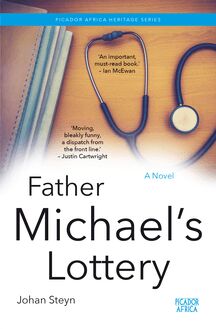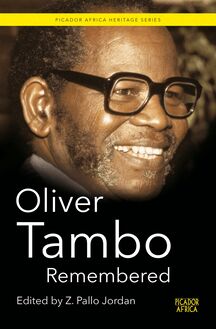The Innocence of Roast Chicken , livre ebook
171
pages
English
Ebooks
2019
Vous pourrez modifier la taille du texte de cet ouvrage
Obtenez un accès à la bibliothèque pour le consulter en ligne En savoir plus
Découvre YouScribe en t'inscrivant gratuitement
Découvre YouScribe en t'inscrivant gratuitement
171
pages
English
Ebooks
2019
Vous pourrez modifier la taille du texte de cet ouvrage
Obtenez un accès à la bibliothèque pour le consulter en ligne En savoir plus
Publié par
Date de parution
01 septembre 2019
Nombre de lectures
1
EAN13
9781770106925
Langue
English
The Innocence of Roast Chicken focuses on an Afrikaans/English family in the Eastern Cape and their idyllic life on their grandparents’ farm, seen through the eyes of the little girl, Kate, and the subtle web of relationships that is shattered by a horrifying incident in the mid-1960s. Scenes from Kate’s early life are juxtaposed with Johannesburg in 1989 when Kate, now married to Joe, a human rights lawyer, stands aside from the general euphoria that is gripping the nation. Her despair, both with her marriage and with the national situation, resolutely returns to a brutal incident one Christmas day when Kate was thrust into an awareness of what lay beneath her blissful childhood. Beautifully constructed, The Innocence of Roast Chicken is painful, evocative, beautifully drawn and utterly absorbing.
Publié par
Date de parution
01 septembre 2019
Nombre de lectures
1
EAN13
9781770106925
Langue
English
Praise for The Innocence of Roast Chicken
‘It was the time of politics with a capital “P” when everything had to relate to the liberation struggle and the overthrow of apartheid in far too prescriptive a manner. Yet the very title of Jo-Anne Richards’s debut novel caught my imagination, so evocative of the Sunday roast chicken of my childhood days, that when I bumped into her at a government reception I spontaneously told her, “Your book is what this country is all about.” This was when a young white woman was not supposed to be the literary flavour of the month. The self-styled literary commissars were outraged. The author was either ahead of her time or her critics were shackled by the ideas of political correctness, race and gender identification. The Innocence of Roast Chicken broke the paradigm. It helped to define the time, giving insight into where some of us had come from, and it pointed the way to what we could become. That’s what great writing should accomplish.’
– RONNIE KASRILS, May 2019
‘Jo-Anne Richards displays a wonderful feeling for place and period … her prose is sharply evocative, and she conjures up the child’s powerful feelings with a vividness intensified by nostalgia.’
– MARGARET WALTERS, The Sunday Times
‘A rapturous and tactile evocation of dust, food, noises and a childhood domain, rendered with a marked empathy for the child and the magical properties of a child’s stamping ground.’
– ELIZABETH BUCHAN, The Times
‘Jo-Anne Richards has the writer’s eye, that natural ability to sniff out the telling detail and the right word. She is a delight to savour – one of the freshest voices to emerge from South African literature in years.’
– PETER GODWIN
‘A fresh and memorable addition to the literature of apartheid.’
– Observer
‘Jo-Anne Richards’s writing seems effortlessly expressive and flows with an unerring feel for authentic detail.’
– WENDY WOODS
The Innocence of Roast Chicken
Also by Jo-Anne Richards
The Imagined Child (2013)
‘Jo-Anne’s trenchant observation of human behaviour, always laced with humour, makes for an engrossing read.’
– ATHOL FUGARD
‘When you start reading The Imagined Child , don’t be surprised to look up and discover it’s gone 3am. Jo-Anne Richards takes the urbanite-moves-to-the-platteland-to-find-herself motif and twists it brilliantly, lacing the narrative with such palpable tension that while immersed in it, I often had to remind myself to breathe. This superbly written, searing study of secrets, motherhood and guilt – both personal and historical – will stay with you long after you’ve finished it.’
– SARAH LOTZ
My Brother’s Book (2008)
‘Richards has an acute sense of place, in its small town and big city guises, and a wonderful ear for South African idiom. My Brother’s Book is her most ambitious work to date. Moving subtly between past and present, it casts a searing light on the way we reveal and conceal our truths in stories.’
– IVAN VLADISLAVIĆ
Sad at the Edges (2003)
‘After the novels of apartheid and of the state of emergency have come the novels of transition: Nadine Gordimer’s None to Accompany Me , Ivan Vladislavić’s The Restless Supermarket , André Brink’s Rights of Desire and, of course, JM Coetzee’s Disgrace . Jo-Anne Richards’s third novel sits squarely in this tradition.’
– MICHIEL HEYNS, Sunday Independent
Touching the Lighthouse (1997)
‘Her writing has the tang of authenticity, so that it seems as if she is truly remembering rather than inventing … The result is as engrossing as it is impressive.’
– ALLAN MASSIE, The Scotsman
The Innocence of Roast Chicken
A Novel
Jo-Anne Richards
With ‘Innocence Lost’ added for this edition
PICADOR AFRICA
First published in 1996 by Headline Publishing
This edition published in 2019 by Picador Africa
an imprint of Pan Macmillan South Africa
Private Bag X19
Northlands
Johannesburg, 2116
www.panmacmillan.co.za
ISBN 978-1-77010-691-8
e-ISBN 978-1-77010-692-5
© Jo-Anne Richards 2019, 1996
All rights reserved. No part of this publication may be reproduced, stored in or introduced into a retrieval system, or transmitted in any form or by any means (electronic, mechanical, photocopying, recording or otherwise), without the prior written permission of the publisher. Any person who does any unauthorised act in relation to this publication may be liable to criminal prosecution and civil claims for damages.
This book is a work of fiction. Any resemblance to actual persons, living or dead, is purely coincidental.
Cover design by K4
Innocence Lost
The Innocence of Roast Chicken was a story that just wouldn’t go away. I denied it for a good three years, but it stubbornly refused to budge. It became all I could focus on. Fearful of waking my young family, I spent my nights huddled on the bathroom floor with a torch, scribbling into a notebook.
On that cold floor, my debut novel took shape. A farm materialised. A child was born, who loved it and believed that ‘everyone should have a farm like that in their childhood’. But I could also see the brutal nature of her coming of age, and the adult she would become.
Yet still, I couldn’t bring myself to recognise it as a real story and type the first word.
Writing was all I had ever wanted to do.
‘A writer?’ my pragmatic mother had declared when the time came to discuss my future. ‘Don’t be silly. Do something sensible.’ Which is how I came to study journalism. She would have preferred a profession that began with a good solid letter, like a D or an L – not the capricious curve of a J. My daughter the … hmm, well, more practical than the alternative.
But the alternative, the soaring spires of the W – that was what I aspired to. At the risk of sounding mawkish, I believed it would give my life meaning and worth.
So, what if I typed the first sentence and it became blindingly obvious that I had no talent? Again, it was one of the practical voices in my life that jolted me from my stasis. ‘Are you intending to carve this book in stone? Has your computer lost its delete button?’
I typed the first sentence, and then the next. I typed the first chapter. I continued typing for a further eighteen months.
The Innocence of Roast Chicken is the book that gave me that elusive W, which allowed me, finally, to call myself a writer. This is the book that changed my life.
One minute I was tapping away in my converted garage in the northern suburbs of Jo’burg – boiling in summer, freezing in winter – the next I was catapulted into a different existence, with a two-book deal in London.
It felt like that, but it took two years to find a publisher. After a couple of encouraging rejections locally, I’d been introduced to a London agent, who, miraculously, liked the book. It took another rejection and enough time (almost) to give up hope, before I received her call.
Nothing could have prepared me for the novel’s reception, that November 1996, either for the praise or the backlash that followed. The book shot to number one in South Africa in the week it was released, and remained there for fifteen weeks. It appeared as the ‘Dark Horse’ on a London bestseller list, alongside Graham Swift’s Last Orders and Hogfather by Terry Pratchett. I was recognised in the street. My face was on television, my voice on radio. I launched at South Africa House in London’s Trafalgar Square, in Germany, in Johannesburg, in Cape Town and in my hometown of Port Elizabeth. I gave countless talks at innumerable functions.
I enjoyed it all. Probably a bit too much. My mistake was to believe it was all about me. I failed to take note of the broader context in which I had been published, despite the words of my very dear mentor and friend, the late Professor Tim Couzens, expert in African literature, who commented, ‘Strange … everyone expected a burst of black writers after ’94.’
What initially emerged instead, on the wave of liberation, was a handful of white writers, referred to by commentators as the ‘new’ writers, either with or without the further appellation ‘white’.
Perhaps it should not have come as a surprise. The 1980s heard repeated arguments for artistic considerations to be secondary to the political in literature. In 1987 JM Coetzee went so far as to call it a literature in bondage, ‘unnaturally preoccupied with power and the torsions of power, unable to move from elementary relations of contestation, domination and subjugation to the vast and complex human world that lies beyond them’.
Njabulo Ndebele drew attention to how little attempt there was to grapple with the minutiae of motive or social process. ‘People and situations are either very good or very bad.’
This prescriptive style, which encouraged the use of culture as a ‘weapon in the struggle’, became a major constraint, perhaps most keenly felt by white writers like myself, who experienced the pressure to ‘show where we stood’ in relation to apartheid – because of our race.
In this spirit of freedom, the ‘new’ writers shifted radically from prescriptive representations to an attempt to describe flawed human lives.
It may well have been this attempt in The Innocence of Roast Chicken that drew such a response. Readers stopped me in the street to tell me what my book meant to them.
The degree of public interest in this book – and as a result, in me – was completely unexpected. My entire focus had been on getting published. This was a debut novel, for which I drew on little more than my instincts as a loving reader.
Yet, somehow, The Innocence of Roast Chicken managed to hook into the mood of the age. Our nation had been through the worst of times, so perhaps the harshness of my protagonist Katie’s coming of age resonated with local readers. Her unsullie



